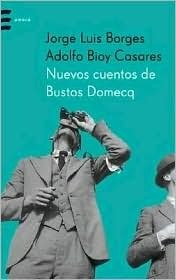
Nuevamente se conjugan los dos escritores, con el seudónimo con el que anteriormente habían publicado "Seis problemas para don Isidro Parodi" y "Crónicas de Bustos Domecq", para producir una serie de fantasías con el común denominador del humor absurdo. Es fama que el cuento "La fiesta del monstruo" es una dura parodia a los tiempos en que Juan Perón gobernaba en Argentina. Contiene: Deslindando responsabilidades El enemigo número 1 de la censura El hijo de su amigo La fiesta del monstruo La salvación por las obras Las formas de la gloria Más allá del bien y del mal Penumbra y pompa Una amistad hasta la muerte
Authors


Jorge Francisco Isidoro Luis Borges Acevedo, usually referred to as Jorge Luis Borges (Spanish pronunciation: [xoɾxe lwis boɾxes]), was an Argentine writer and poet born in Buenos Aires. In 1914, his family moved to Switzerland where he attended school and traveled to Spain. On his return to Argentina in 1921, Borges began publishing his poems and essays in Surrealist literary journals. He also worked as a librarian and public lecturer. Borges was fluent in several languages. He was a target of political persecution during the Peron regime, and supported the military juntas that overthrew it. Due to a hereditary condition, Borges became blind in his late fifties. In 1955, he was appointed director of the National Public Library (Biblioteca Nacional) and professor of Literature at the University of Buenos Aires. In 1961, he came to international attention when he received the first International Publishers' Prize Prix Formentor. His work was translated and published widely in the United States and in Europe. He died in Geneva, Switzerland, in 1986. J. M. Coetzee said of Borges: "He, more than anyone, renovated the language of fiction and thus opened the way to a remarkable generation of Spanish American novelists."